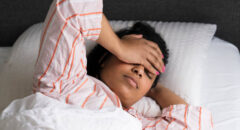 Some may think that medical marijuana is the miracle drug that seems to cure all. From staving off breast cancer to balancing your mood and sending you straight to sleep, Mary Jane is a lot of people’s drug of choice. However, contrary to what many may believe and the American Academy of Sleep Medicine, medical marijuana shouldn't be used to treat sleep apnea.
Some may think that medical marijuana is the miracle drug that seems to cure all. From staving off breast cancer to balancing your mood and sending you straight to sleep, Mary Jane is a lot of people’s drug of choice. However, contrary to what many may believe and the American Academy of Sleep Medicine, medical marijuana shouldn't be used to treat sleep apnea.
The group warned that the drug and its synthetic extracts haven't been shown to be safe, effective or well-tolerated by patients with this condition.
"Until we have further evidence on the efficacy of medical cannabis for the treatment of sleep apnea, and until its safety profile is established, patients should discuss proven treatment options with a licensed medical provider at an accredited sleep facility," said statement lead author Dr. Kannan Ramar. He's a professor of medicine with the Mayo Clinic's division of pulmonary and critical care medicine, in Rochester, Minn.
In November 2017, the Minnesota Department of Health added obstructive sleep apnea as a new qualifying condition for its medical marijuana program.
But in a statement published in an issue of the Journal of Clinical Sleep Medicine, the sleep academy urged states toexclude sleep apnea from the list of chronic health issues that may be included in these programs. In the United States, nearly 30 million adults are affected by sleep apnea. This condition occurs when the upper airway repeatedly collapses during sleep, resulting in snoring and daytime sleepiness.
Current treatments for sleep apnea include CPAP therapy, where patients wear a mask that provides mild levels of air pressure that help keep their throats open.
Some animal studies have suggested that the synthetic marijuana extract, dronabinol, could improve respiratory stability. Follow-up studies involving people have investigated the use of this drug as a new treatment option for those with sleep apnea.
But the sleep academy pointed out that dronabinol is not yet approved by the U.S. Food and Drug Administration for the treatment of sleep apnea.
The long-term safety and effectiveness of the drug and various ways people can take the drug, such as vaping and liquid formulations, are unknown. Medical marijuana may also cause daytime sleepiness and other side effects, which may make driving dangerous, the sleep academy added.
"Until there is sufficient scientific evidence of safety and efficacy, neither marijuana nor synthetic medical cannabis should be used for the treatment of sleep apnea," Dr. Ilene Rosen, president of the sleep academy, said in an academy news release.
"Effective and safe treatments for sleep apnea are available from licensed medical providers at accredited sleep facilities," she added.
If you’re suffering from a sleeping disorder, know that you have options for accessible and affordable treatments. For more information on sleep apnea and sleeping disorders, visit our Health Conditions tab on BlackDoctor.org.
SOURCE: American Academy of Sleep Medicine, news release, April 16, 2018









